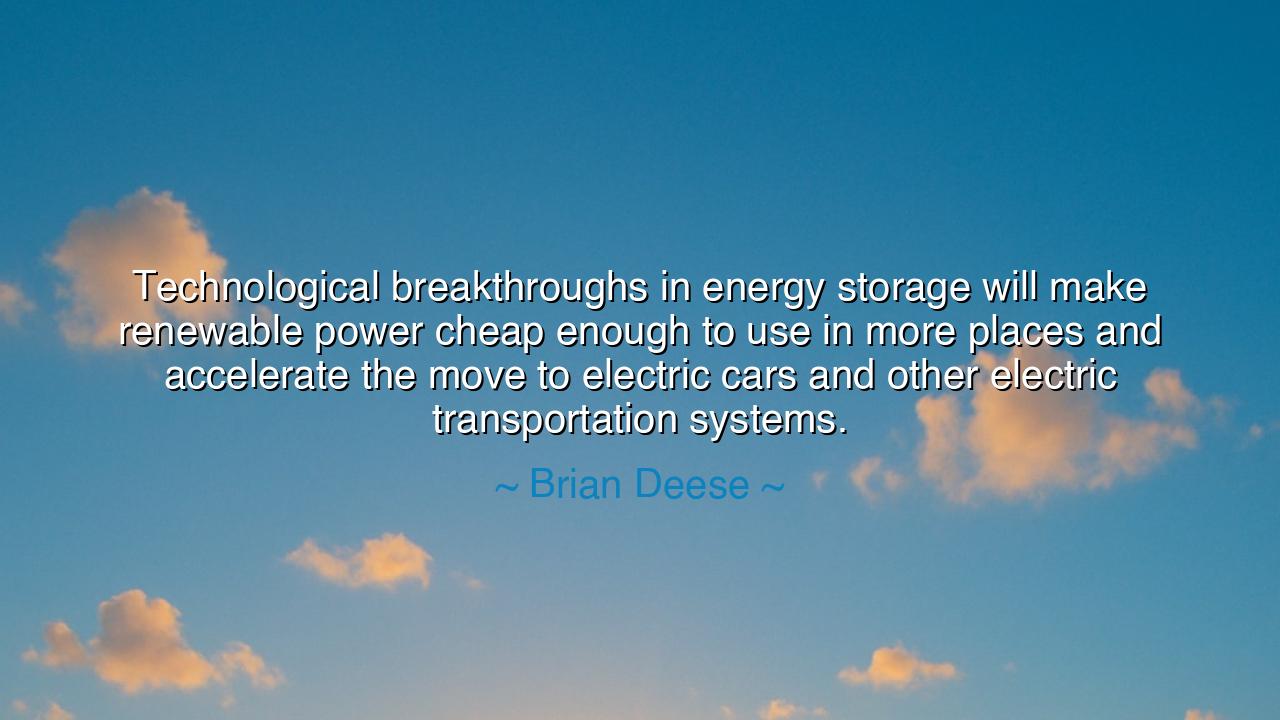
Technological breakthroughs in energy storage will make
Technological breakthroughs in energy storage will make renewable power cheap enough to use in more places and accelerate the move to electric cars and other electric transportation systems.






In the words of Brian Deese—“Technological breakthroughs in energy storage will make renewable power cheap enough to use in more places and accelerate the move to electric cars and other electric transportation systems.”—we hear not only the voice of a strategist, but the cry of a seer who gazes into the future. He speaks of energy storage, that hidden vessel in which the gifts of sun and wind may be captured, preserved, and released. Without such vessels, the gifts are fleeting; with them, the world may be transformed.
The ancients themselves revered the art of storage. The Egyptians built granaries along the Nile, for they knew that the abundance of harvest must be preserved against the lean years. In the same way, modern humanity must learn to store the power of the sun and the wind, for nature’s rhythms are abundant but uneven. Just as stored grain fed empires, so will stored energy sustain nations. Deese’s words remind us that technology is the new granary of civilization.
The mention of electric cars and transportation systems speaks to a larger vision: the liberation of movement from chains of oil and smoke. In ancient Rome, aqueducts carried water across deserts, turning dry lands fertile; in our age, electric systems may carry clean power across cities and nations, turning polluted skies clear. Each breakthrough is not merely a technical feat but a heroic reordering of life, where necessity bows to ingenuity.
History shows that such transitions mark new epochs. When James Watt perfected the steam engine, it was not only a machine but a revolution, altering commerce, travel, and the destiny of nations. So too, the mastery of energy storage will be no small invention, but a turning of the ages, a moment when the world steps from dependence upon the old fire of coal and oil into the new dawn of renewables.
Thus, let us learn: the tools we fashion today are not only for comfort, but for destiny. The breakthroughs Deese speaks of are more than wires and batteries—they are vessels of hope, promises to generations that life may be lived without poisoning the earth. The ancients taught that wisdom is the art of binding the future to the present. So too must we embrace these technologies, for in them lies the power to preserve creation, to cleanse the skies, and to set humanity upon a path worthy of its spirit.






VVan
Brian Deese’s prediction about energy storage breakthroughs points to a potentially exciting shift in how we use renewable energy. But how much will the cost of electric vehicles decrease as a result? What role will government policies play in accelerating the shift to electric transportation? Will it be enough to push electric cars into mainstream adoption, or will higher initial costs continue to be a barrier for many potential buyers?
THHuynh Van Tuan Hung
I find the idea of breakthroughs in energy storage making renewable power cheaper an exciting prospect. It makes me think, though: while technology may make renewable energy more affordable, will we also see changes in how electricity is distributed and accessed in underserved communities? Will these advancements lead to more equitable energy access, or could there be unintended consequences for communities already facing energy inequality?
HNNhi Ho nguyen
Deese’s statement raises hope for a future powered by renewable energy and electric transportation, but it also prompts a few questions: Will the price of renewable energy drop enough to make it competitive with traditional energy sources in all areas? Will electric cars truly become accessible to everyone, or will they remain limited to certain income levels or geographic regions where the infrastructure exists?
MMagic
The idea of cheaper renewable energy thanks to breakthroughs in energy storage is promising, but I wonder how quickly these advances will be integrated into existing transportation networks. Can electric cars and renewable energy become a truly widespread option without significant investment in infrastructure? How much longer will it take for renewable energy to replace fossil fuels in a way that benefits both the economy and the environment?
NVPhap Nguyen Van
It’s exciting to think about how technological advancements in energy storage could make renewable power more affordable and widespread. However, how realistic is it to think that these developments will happen quickly enough to meet the urgent demand for sustainable energy solutions? What barriers might still remain in making electric transportation systems more accessible to people in rural or less-developed areas where infrastructure may not be as robust?